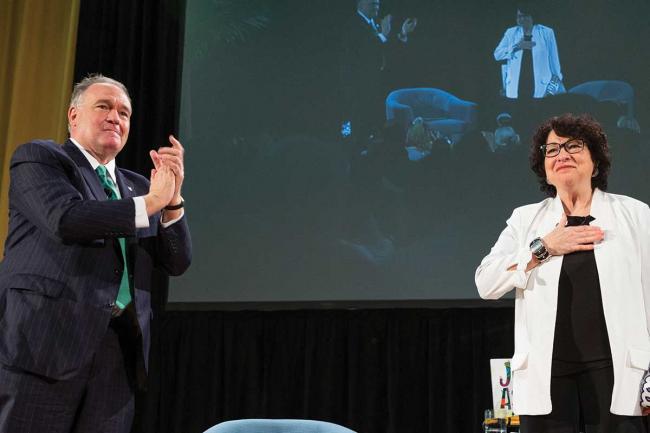Her first judicial appointment was as a federal judge on the U.S. District Court, Southern District of New York, in 1992. From her years on the bench she said she wanted the audience to understand, “The law is not just in a sense of right and wrong. If it were, there are so many things that would turn out differently in court.”
The law is “a way of regulating people’s relationships with one another.” It addresses “the competing interests that we have with one another.”
“But we’re not black and white, are we? So many things that judges deal with are in gray areas.
“The only justice we can give you is to tell you what the law says. But the sense of what the law says is something you can change.”
Sotomayor emphasized, “Laws are passed by men and women. They’re signed by presidents.” But laws can be revoked, modified, amended and changed “when they’re no longer serving the purpose that we in our society think is the right purpose.”
“That’s what you have to remember about the law all the time,” said Sotomayor. “If you don’t like something that is happening out there, get up and change it. Don’t complain about it. Don’t give up. If you can vote, anyone who misses an election, shame on you.”
Importance of Friendship
“What should universities do to support students from different backgrounds?” asked Fitts. “Teach them how to study, budget time, write papers and master basic life skills,” Sotomayor replied. But also teach them how to make friends.
In her 2013 memoir My Beloved World, Sotomayor wrote, “With every friend I’ve known, in every situation I’ve encountered, I have found something to learn.”
Sotomayor told the Tulane audience this October night that she knows she’s lucky she found her passion early. She’s never wanted to do anything else but be a lawyer or judge, and she’s in a profession she loves.
But she gave this career advice: “What I wanted to tell you all, who might not know what you want to do, is look for that thing that makes you happy, that thing that engages you in a way that leaves you at the end of a night’s studying wanting more.
“And can you be honest enough with yourself to not judge yourself by others’ expectations.
“Enjoy what you’re doing, and if you enjoy what you’re doing, you can make a difference.” Fitts, whose friendship with Sotomayor goes back 40 years, was pleased with her replies. “This is a seminar in what it means to be a great human being,” he said.
Fitts concluded the evening with the announcement that Tulane has established a four-year, full-tuition scholarship named after Sotomayor. The scholarship is designated for a student who is dedicated to public service.
Above photo: Tulane President Mike Fitts and Justice Sonia Sotomayor (by Kathy Anderson)































































